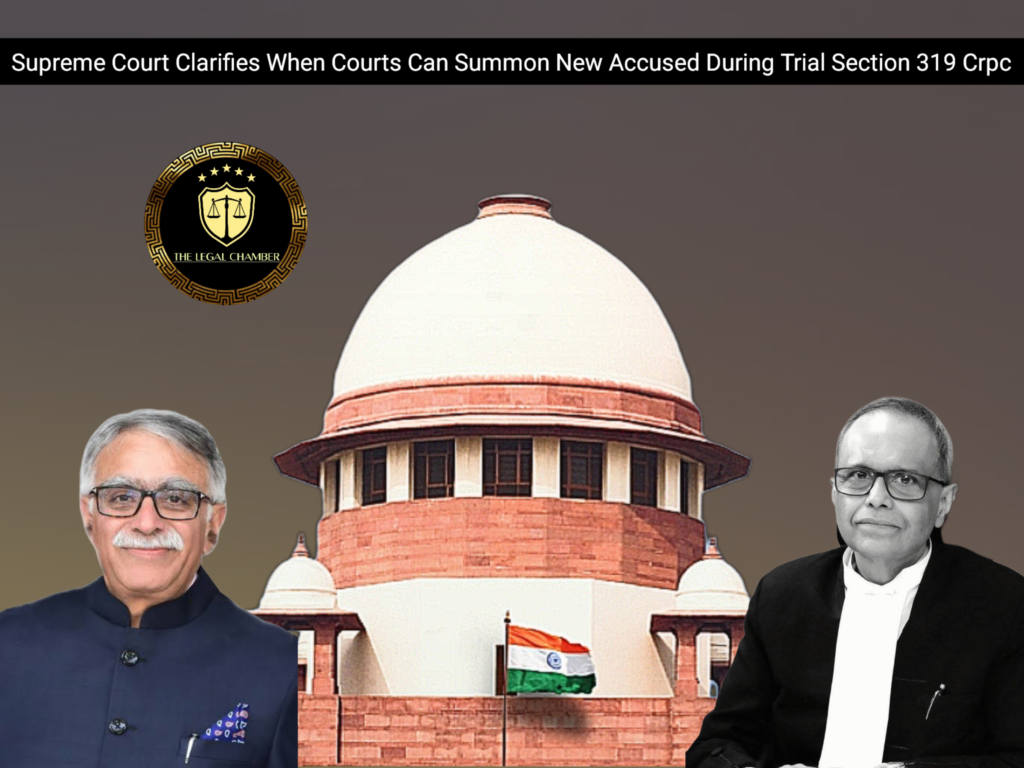
The Supreme Court clarified the legal principles governing the exercise of power under Section 319 of the CrPC, emphasizing that it can be invoked based on evidence collected during trial, even if the person was not charge-sheeted. The Court held that the standard for summoning an additional accused is stricter than a prima facie case but does not require proof beyond reasonable doubt. The evidence must show strong complicity, and the power should be exercised sparingly to ensure fairness. The Court restored the Trial Court’s summoning order, underscoring that the High Court erred in conducting a mini-trial at this stage. The judgment reaffirmed that the provision aims to prevent the guilty from escaping justice.
Facts Of The Case:
The case arose from an incident on 29th November 2017, where two FIRs were lodged. The first FIR was filed by Shiv Baran (appellant) under Sections 302, 307, 504, and 506 of the IPC, alleging that four accused—Rahul, Dinesh, Rajendra, and Shiv Moorat—entered his house, assaulted his brother, leading to his death. The second FIR, unrelated to the appeal, was filed by Suresh Kumar for assault and abuse. The police charge-sheeted only Dinesh Yadav and Shiv Murat Yadav, excluding Rajendra Prasad Yadav (Respondent No. 2) due to insufficient evidence. During the trial, witnesses (PW1, PW2, and PW3) implicated Rajendra, prompting the appellant to seek his summoning under Section 319 CrPC. The Trial Court initially rejected the application but later allowed it on remand. The High Court quashed the summoning order, observing that the witnesses did not clearly ascribe a role or motive to Rajendra. The Supreme Court, however, found that the witnesses consistently named Rajendra, attributing a specific role (armed with a baton) and presence at the crime scene. It held that the High Court erred in demanding a higher standard of proof at the summoning stage and restored the Trial Court’s order, directing Rajendra to face trial. The Court emphasized that Section 319 CrPC aims to ensure no guilty person escapes trial.
Procedural History:
The procedural history of the case began with the lodging of two FIRs on 29th November 2017, with the appellant’s FIR implicating four accused, including Rajendra Prasad Yadav. The police charge-sheeted only two accused, excluding Rajendra. During the trial in Sessions Trial No. 109 of 2018, the appellant moved an application under Section 319 CrPC to summon Rajendra as an additional accused based on witness testimonies. The Trial Court initially rejected the application on 31st January 2022 but later allowed it on 28th September 2023 after a remand by the High Court. Rajendra challenged this summoning order before the Allahabad High Court, which quashed it on 23rd July 2024, holding that the evidence did not sufficiently establish his complicity. Aggrieved by this decision, the appellant approached the Supreme Court, which granted leave and ultimately set aside the High Court’s order. The Supreme Court restored the Trial Court’s summoning order, ruling that the High Court had erroneously applied a higher standard of proof at the summoning stage. The case was remanded for trial, with directions to expedite proceedings within 18 months.
READ ALSO :Supreme Court Rules in Favor of Unselected Judge Candidate
Court Observation:
The Supreme Court made several key observations while deciding the case. It emphasized that Section 319 CrPC is an enabling provision meant to ensure no guilty person escapes trial, provided there is cogent evidence indicating their involvement. The Court clarified that the standard for summoning an additional accused is stricter than prima facie satisfaction but does not require proof beyond reasonable doubt. It noted that the High Court erred in conducting a mini-trial by scrutinizing witness credibility and motive at the summoning stage, which should instead be examined during the full trial. The Court further observed that witness testimonies (PW1, PW2, PW3) consistently named Rajendra Prasad Yadav and assigned him a specific role (armed with a baton), which was sufficient to proceed against him. It reiterated that statements under Section 161 CrPC can only be corroborative and not standalone evidence, but examination-in-chief untested by cross-examination can still form the basis for summoning under Section 319. The judgment underscored that the Trial Court’s satisfaction must be based on stronger evidence than mere probability but need not reach the threshold required for conviction. Ultimately, the Court held that the High Court’s interference was premature and restored the Trial Court’s summoning order to ensure a fair trial.
Final Decision & Judgement:
The Supreme Court allowed the appeal, setting aside the Allahabad High Court’s order dated 23rd July 2024 that had quashed the summoning of Rajendra Prasad Yadav (Respondent No. 2). The Court restored the Trial Court’s order dated 28th September 2023, which had summoned Rajendra as an additional accused under Section 319 CrPC. The Bench, comprising Justices Sanjay Karol and Joymalya Bagchi, held that the High Court erred in applying an unduly strict standard at the summoning stage, effectively conducting a mini-trial rather than assessing whether a prima facie case existed. The Supreme Court emphasized that the witness testimonies (PW1, PW2, PW3) provided sufficient material to proceed against Rajendra, as they consistently named him and ascribed an active role in the crime. It clarified that the degree of satisfaction required under Section 319 CrPC is higher than a mere prima facie case but lower than conclusive proof of guilt. The Court directed the Trial Court to expedite the proceedings, mandating completion within 18 months, and ordered all parties to cooperate without unnecessary adjournments. The judgment reaffirmed the proactive role of courts in ensuring that no guilty person escapes trial, while cautioning against casual or mechanical invocation of Section 319 CrPC. All pending applications, if any, were disposed of accordingly.
Case Details:
Case Title:Shiv Baran vs. State of U.P. & Anr. Citation:(2025) INSC 860 Criminal Appeal No.:Criminal Appeal No. 3008 of 2025 Date of Judgment:16th July 2025 Judges/Justice Name: Justice Sanjay Karol & Justice Joymalya Bagchi
Download The Judgement Here